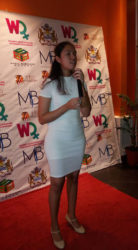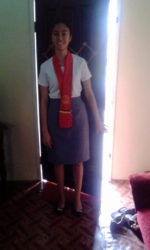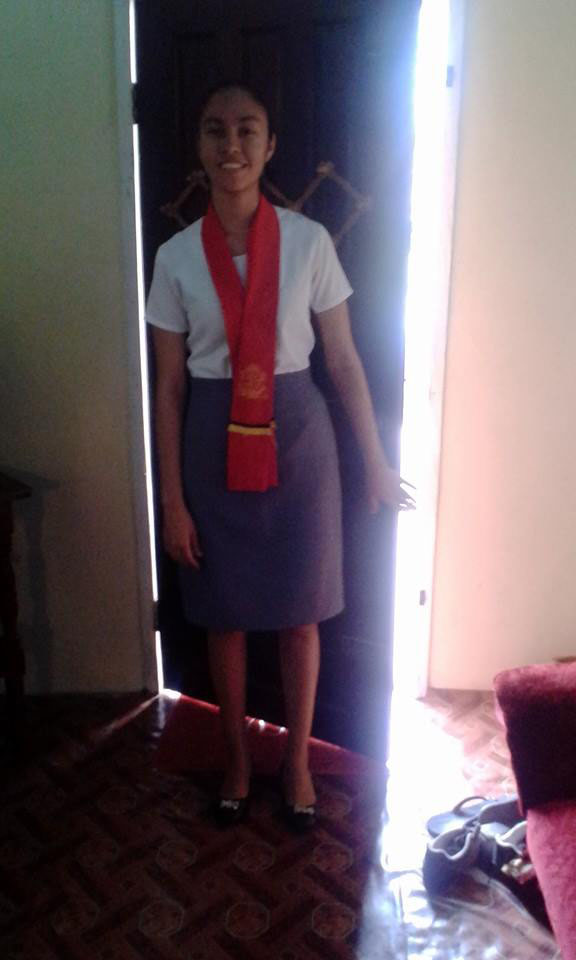At 21, Rosemarie Ramitt has already fought many battles and while she has tasted the sweetness of victory time and again, her struggles continue, not just for herself, but for many others in the same situation.
Six years ago at the age of 13, Ramitt—then a second form student—thought her life was about to end when her vision suddenly started to go and she was forced to leave school. Even today it is hard for Ramitt to put into words just how she felt when it finally hit home that she would never see again.
“Before then I was normal. I never had any pre-existing condition so it came as a shock. It started with headaches. I use to get migraines and then my eyes turned red… when we went to the hospital they said it was allergies and they sent me back home. It was not until my vision started decreasing that they referred me to an ophthalmologist,” the young woman told the Sunday Stabroek in a recent interview.
 What the ophthalmologist had to say, was what no one wants to hear: that it was too late and Ramitt would go completely blind. She was diagnosed with uveitis, a condition that causes inflammation in middle layer of the eye. For over a year Ramitt had a roller-coaster experience as different physicians told her that she would see again but not 100 per cent. She was placed on medication and when she used it, her sight would return, but then it would go again. After spending quite a while in Brazil where operations were done, she was finally told she would not see again. It was inexplicable, because the condition is curable, but the doctors could not explain why it kept re-occurring.
What the ophthalmologist had to say, was what no one wants to hear: that it was too late and Ramitt would go completely blind. She was diagnosed with uveitis, a condition that causes inflammation in middle layer of the eye. For over a year Ramitt had a roller-coaster experience as different physicians told her that she would see again but not 100 per cent. She was placed on medication and when she used it, her sight would return, but then it would go again. After spending quite a while in Brazil where operations were done, she was finally told she would not see again. It was inexplicable, because the condition is curable, but the doctors could not explain why it kept re-occurring.
Ramitt said she went into a state of depression as black as the world around her. “When it finally dawned on me that this is how it is going to be, I never use to really go out much. I use to cry a lot because I could have never understood why this had to happen to me and I was so young… I could not see the positive side of it,” she said.
Today, Ramitt believes that going blind may have been the best thing that happened to her because as she puts it, “I would not have been as strong as I am.”
A trained teacher, Ramitt is a current student at the University of Guyana (UG); she also teaches part time in the afternoon at the Guyana Society for the Blind.
 But more importantly, Ramitt uses her new-found voice to speak it for persons living with disabilities; she said that they are often taken for granted and treated as less than equal when they have so much to contribute to society.
But more importantly, Ramitt uses her new-found voice to speak it for persons living with disabilities; she said that they are often taken for granted and treated as less than equal when they have so much to contribute to society.
The positive side
Her new journey started at the age of 16 when with the assistance of her father she signed up with the National Commission on Disability and was invited to be part of the organisation’s youth arm, Young Voices Guyana.
It was during this period that she slowly began to accept her blindness.
She was among the first students who wrote the Caribbean Secondary Education Certificate examinations through the Guyana Society for the Blind and was one of their top students in 2014; she immediately enrolled in the Cyril Potter College of Education (CPCE). She graduated last year and started teaching at the Ministry of Education’s Unit for the Blind located in Alberttown and simultaneously also began to read for a Diploma in Social Work, following which she would commence the degree in Education programme.
“… Accepting it [blindness] has opened so many doors for me because sometimes every year I travel to different conferences where I represent persons with disability, especially youth and I always talk about education and employment and the status of persons living with disability in Guyana,” Ramitt said.
She believes that were it not for her disability she would not be where she is today as she would not have gone to CPCE because as a child she never wanted to be a teacher.
“It was not until I actually started teaching that I realised that I love this profession. I love teaching. I teach full time, I teach part time…,” she said.
It has not been all smooth sailing but every negative experience has only strengthened her resolve to always speak out for herself and others. She pointed out that persons would immediately assume that a person with disability cannot do much for themselves and as it relates to her studies, that she cannot contribute to group work.
“I am the kind of person who does not sit and allow you to discriminate, if it is against me or anyone else once I am there I will open my mouth…,” she said, adding that there are about 11 blind persons attending UG at present and as such the sensitization is more than it was in the past.
Ramitt said she does very well at her studies and at the end of the semester when her grades came out, unlike before, persons began lining up to be in a group with her. She does not brag about her grades, “but I work hard so I say my grades are a reflection of my work; if I work hard I would do well if I don’t work hard I would not….”
The young woman said transportation is a challenge for her. She recalled one day when stood on the road in her CPCE uniform with her cane and bus operators refused to pick her up. She was so incensed that she spoke out about it on national radio. “I am the kind of person, I don’t believe in sitting and allowing people to be ignorant about certain things because it goes a far way in our development. I am a person who would stop it right there.”
There was another incident where the driver of a taxi service that she uses refused to take her home because of her disability. She complained and eventually the owner of the service contacted her and apologised.
‘Somewhat of a bully’
Ramitt described herself as “somewhat of a bully” when it comes to persons with disabilities. “I can’t sit and take discrimination… It doesn’t only happen to me and I think if I don’t stand up, it will happen to somebody else who may not stand up… and that is the cycle that just keeps going around all the time.”
As a result she would stand up at every opportunity she gets “and make an issue because people need to know that they cannot do those things.”
She pointed out that the general preconceived notions persons have as regards those living with disabilities means that they don’t even give them a chance. First impressions do not matter since they already have a fixed idea in their heads.
But it has not all been negative and as the young teacher puts it “where you find bad people you will always find good people.” Sometimes strangers would assist her on the streets; she has found children more receptive than adults.
The second of four children, Ramitt travels from Nonpareil, East Coast Demerara every day.
All she does and has become could not have happened without the support of her family and while her parents were initially overprotective, Ramitt said they eventually allowed her the independence she needed.
“They do not see my disability because sometimes my mother would say, ‘you get lazy, you use to wash wares now you don’t wash wares’ and I have a younger brother and sister and they would come to me for help with their assignments. So it is like they don’t see my disability…,” she noted.
Her parents do not question her decisions, they fully support her and this helps cement her independence.
Passion
Special education and education for persons with disabilities is one of Ramitt’s passions. She remains conscious that she almost lost the opportunity to finish school and she wants to assist young persons who might be at a low point in their lives, or facing constraints. That is why when she was awarded a teaching post at the Bladen Hall Multilateral School she requested to be transferred to the Unit for the Blind.
“I have been there. I have been at a low point, the lowest point in my life and I have risen and have achieved so much… That, I think, is my internal motivation for my work. When I teach I not only teach them academics but I also teach them how to be independent. I teach [them] how to address people when they are being too rough…,” Ramitt said.
She works with two students, who both attend North Georgetown Secondary School; they were both born blind. Ramitt said she sits and talks with them and helps them to understand that there is so much they can achieve in life.
“My work is really my life, my profession is my life, and it is so much deeper than just coming here and teaching them and then going home,” she added.
She attends classes with them at the school and take their notes and upon returning to the unit they transfer the notes to their computers.
“My life today, you know I am happy. I have achieved so much and I am very grateful,’ Ramitt said, adding that she wants to do more for persons with disabilities.
Marriage and children are currently not on Ramitt’s list; she does not believe that she needs a husband and children to be happy. “Nothing is wrong with having someone in your life, but… I believe my work, my academic pursuits, they make me happy. The work I do to help people, those things make me happy. Yes I date every now and then,” she said with a small laugh.
During the holidays Ramitt said, she has a good social life but during school time she focuses on her job and studies.






